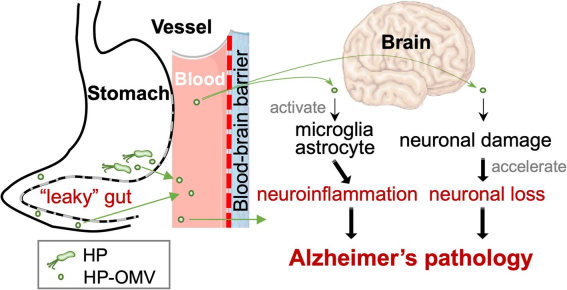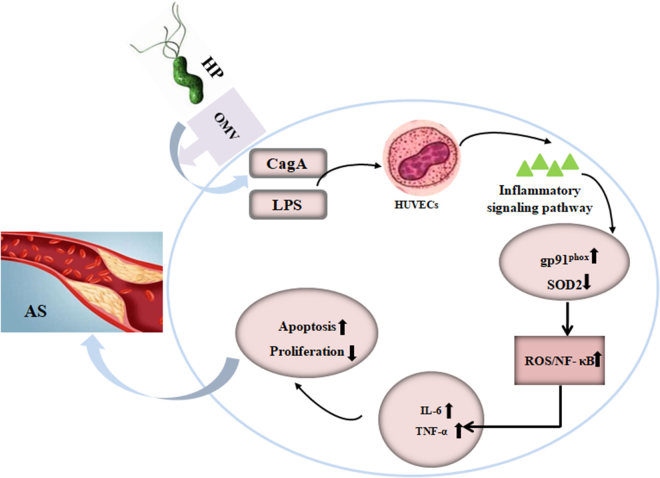Helicobacter pylori-derived Exosome Research and Application
Helicobacter pylori is a spiral-shaped short rod Gram-negative bacterium, colonizing human gastric mucosa. It is well known that over 50% of the global population is infected by this bacterium, and its chronic infection is not only associated with an increased risk of gastritis, gastric ulcers, and gastric cancer, but has also been linked in recent studies to the risk of developing Alzheimer's Disease (AD), atherosclerosis, and liver diseases. Besides directly infecting cells and tissues, this bacterium also releases exosomes to enhance its infectiousness. Creative Biolabs focuses on the research of Helicobacter pylori-derived exosomes, as this can not only help deepen the understanding of the infection mechanisms of this bacterium, but may also provide new clues for the etiology and treatment of various diseases.
Helicobacter pylori-derived Exosomes Participate in Infection Progression
Many research findings suggest that exosomes released by Helicobacter pylori play a vital role in its infection process:
-
Transmission function: Exosomes released by Helicobacter pylori can effectively deliver bacterial components to host cells, further promoting the persistence of the bacterium.
-
Interaction with host cells: Helicobacter pylori-derived exosomes contain various bioactive compounds that can enter host cells and affect their signaling pathways. This interaction can promote apoptosis in epithelial cells and immune-activated cells. Additionally, these exosomes can cross various barriers, leading to the distribution of bacterial antigens within the host body, further triggering or regulating the host's inflammatory and immune responses.
-
Carrying toxic factors: Helicobacter pylori toxic factors associated with Helicobacter pylori-derived exosomes play a crucial role during infection, strengthening or reducing the immune responses that guide disease development. These toxic factors interact with the host's immune system, potentially leading to the development of infectious diseases.
-
Enhancing bacterial survival: In some situations, Helicobacter pylori-derived exosomes provide a protective mechanism, helping Helicobacter pylori resist various environmental and antibiotic pressures, thereby increasing its survival rate within the host body.
In summary, Helicobacter pylori-derived exosomes play a crucial role in the infection process and are mainly found to be associated with gastric diseases, Alzheimer's Disease, atherosclerosis, and liver diseases.
Helicobacter pylori-derived Exosomes and Gastric Diseases
Helicobacter pylori is the main pathogen leading to various gastric diseases such as gastritis, gastric ulcers, and gastric cancer. In recent years, many studies have shown that exosomes play a crucial role in the development of gastric diseases:
-
Helicobacter pylori-derived exosomes carry over 400 proteins and induce significant proteomic changes in host cells.
-
Helicobacter pylori-derived exosomes affect key signaling pathways like PI3K-Akt and several inflammation and cancer-related pathways.
-
Helicobacter pylori-derived exosomes can stimulate the secretion of the inflammatory cytokine interleukin-8, and further promote inflammatory responses by activating nuclear factor κB.
Based on these findings, many researchers have proposed strategies for treating gastric diseases using Helicobacter pylori-derived exosomes:
-
Vaccine Development: As Helicobacter pylori is becoming resistant to various antibiotics, vaccines have become a promising alternative to traditional treatments. Helicobacter pylori-derived exosomes carry abundant antigenic information and enhance T-cell immune responses, providing guidance for effective vaccine development.
-
Targeted Treatment: Analyzing the role of Helicobacter pylori-derived exosomes during infection could provide new treatment strategies for preventing diseases.
Helicobacter pylori-derived Exosomes and Alzheimer's Disease
Some researchers have proposed that Helicobacter pylori-derived exosomes participate in the development of Alzheimer's Disease:
-
Helicobacter pylori-derived exosomes can trigger neuroinflammation. In vitro experiments showed that microglial cells co-cultured with Helicobacter pylori-derived exosomes exhibited increased cell proliferation, inflammatory cytokine production, and migration.
-
In Alzheimer's Disease model mice, activated microglial and astrocytic cells appeared near amyloid plaques after infection with Helicobacter pylori.
-
Helicobacter pylori-derived exosomes can cross biological barriers and eventually reach the brain. These exosomes are taken up by astrocytes, leading to glial cell activation and neurological dysfunction, further resulting in amyloid β pathology and cognitive decline.
Based on these findings, designing treatment methods targeting specific components or mechanisms within Helicobacter pylori-derived exosomes may provide new avenues for Alzheimer's Disease treatment.
 Fig.1 A working hypothesis on the roles of Helicobacter pylori-derived outer membrane vesicles in Alzheimer's disease pathology.1,3
Fig.1 A working hypothesis on the roles of Helicobacter pylori-derived outer membrane vesicles in Alzheimer's disease pathology.1,3
Helicobacter pylori-derived Exosomes and Atherosclerosis
Research has found that Helicobacter pylori-derived exosomes impair vascular endothelial cells by inhibiting their proliferation and promoting the production of inflammatory factors, thus accelerating the formation of atherosclerotic plaques. In-depth studies on Helicobacter pylori infection and its exosomes, especially their carried virulence factors and lipopolysaccharides, might provide new strategies and directions for the treatment of atherosclerosis.
 Fig.2 Schematic representation of the effect of Helicobacter pylori-derived outer membrane vesicles on atherosclerosis plaque formation.2,3
Fig.2 Schematic representation of the effect of Helicobacter pylori-derived outer membrane vesicles on atherosclerosis plaque formation.2,3
Helicobacter pylori-derived Exosomes and Liver Diseases
-
Promoting liver fibrosis: Research shows that Helicobacter pylori-derived exosomes significantly increase the expression of fibrosis markers in hepatic stellate cells. This implies that Helicobacter pylori-derived exosomes might promote the activation of hepatic stellate cells, thereby increasing the expression of liver fibrosis markers.
-
Inhibiting autophagy in hepatic stellate cells: Helicobacter pylori-derived exosomes can inhibit autophagy flow in HSCs, achieved by increasing the expression of autophagy-related molecules. This inhibition of autophagy might be associated with the development of liver diseases.5
In the future, a deeper understanding of the mechanisms through which Helicobacter pylori-derived exosomes regulate hepatic stellate cells might open new strategies and targets for liver disease treatment.
Based on the research on Helicobacter pylori-derived exosomes, we foresee their use in treating diseases associated with Helicobacter pylori infection in the future. If you have needs in exosome research, feel free to contact us. As an industry-leading provider of exosome technology services and products, Creative Biolabs is always here to support you.
Bacteria-derived Exosome Isolation and Identification
In Vitro Functional Discovery of Bacteria-derived Exosomes
In Vivo Functional Discovery of Bacteria-derived Exosomes
References
-
Park, AM.; Tsunoda, I. Helicobacter pylori infection in the stomach induces neuroinflammation: the potential roles of bacterial outer membrane vesicles in an animal model of Alzheimer's disease. Inflammation and Regeneration. 2022, 42(1):39.
-
Wang, N.; et al. Role of outer membrane vesicles from Helicobacter pylori in atherosclerosis. Frontiers in Cell and Developmental Biology. 2021.
-
under Open Access license CC BY 4.0, without modification.
For Research Use Only. Cannot be used by patients.
Related Services:

 Fig.1 A working hypothesis on the roles of Helicobacter pylori-derived outer membrane vesicles in Alzheimer's disease pathology.1,3
Fig.1 A working hypothesis on the roles of Helicobacter pylori-derived outer membrane vesicles in Alzheimer's disease pathology.1,3
 Fig.2 Schematic representation of the effect of Helicobacter pylori-derived outer membrane vesicles on atherosclerosis plaque formation.2,3
Fig.2 Schematic representation of the effect of Helicobacter pylori-derived outer membrane vesicles on atherosclerosis plaque formation.2,3








